#whew that’s all of them
Text

hey I redesigned them again
close ups under the cut


boy why are you so eyelash
#SUN TOOK FOREEEEVER#GOD#first art post of 2024 lesgo#anyways#I Hope this doesn’t flop or else I’ll kill myswlf#sun#moon#fnaf#five nights at freddy's#secruity breach#fnaf security breach#sundrop#moondrop#sunrise#fnaf sun#fnaf moon#sun and moon#daycare attendant#fnaf sb#I think that’s them all whew#not a art tag
764 notes
·
View notes
Photo

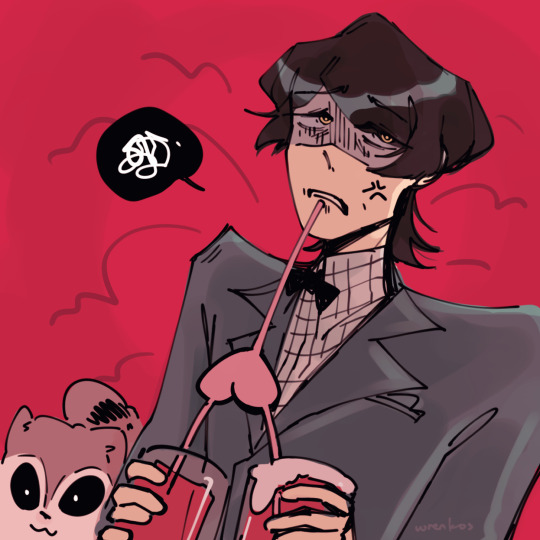
perfect crime trio goes on an outing
#edgar allan poe#ranpo edogawa#mushitaro oguri#ranpoe#mushiranpoe#poe bsd#ranpo bsd#mushitaro bsd#mushitarou oguri#perfect crime trio#bsd#bungo stray dogs#bungou stray dogs#WHEW i think thats all of them wait no hold on#karl bsd#NOT TO FORGET HIM!#havent drawn art for fandom in soo longgg then i fell into a like#brainrot hell over mushitaro reactivating over seeing him animated LOL#he is my faveee. anyway yah#valentines day#my art
6K notes
·
View notes
Text
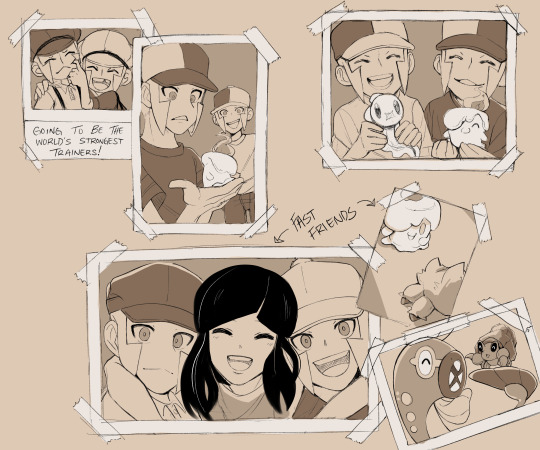


Emmet month - Day 4: Memories
though Ingo may be gone, he'll never be forgotten
#submas#subway bosses#subway boss ingo#subway boss emmet#subway boss nobori#subway boss kudari#gym leader elesa#nimbasa trio#monthofemmet#my art#whew i am 4 days late ;;#anyway i let myself keep this one much MUCH less refined (as hard as it was to do that slkgj)#also bringing back the kid submas designs i did a looooong time ago#like them as young trainers that one#anyway of course i choose to do something sad with this one hehe#emmet sitting all alone in his apartment looking through old photo albums ;-;#gettin' tear stains all over the pages
1K notes
·
View notes
Text
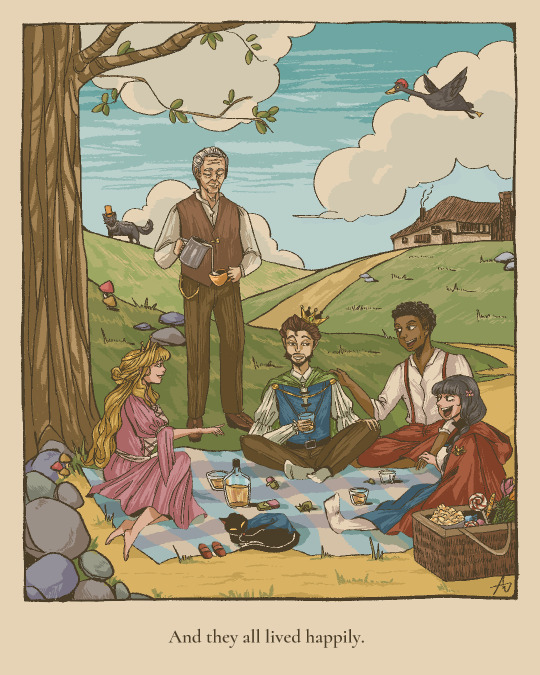
our destiny's children
#AND THEY ALL LIVED HAPPILY#IM GONNA MISS THEM SO MUCH#really loved this season!#it's not perfect but it was fun when it wanted to be and scary when it needed to be#also i love happy endings#and the characters!!#im a fan of fairytales so twisting and merging their storylines like they did was so interesting to me#plus the minis and maps!!!#WHEW#everyone went all out and i appreciate all their hard work#dimension 20#fanart#neverafter#neverafter spoilers#d20 neverafter#dimension 20 spoilers#d20 fanart#princess rosamund du prix#pib#ylfa snorgelsson#pinocchio#prince gerard of greenleigh#mother timothy goose#the gander#the big bad wolf
2K notes
·
View notes
Text
no because really, i think stede is operating in a way he thinks will win him respect. i think he's operating in a way he thinks is the expectation. i don't think he likes it, and i don't think it's "him," but i think he enjoys the positive reinforcement from everyone around him. he's literally never had that before in his life.
he was bullied as a child for what he enjoyed. he was cast aside by his father for being himself. the crew threatened to mutiny against him or even just flat-out kill him because he was too "weak."
and here he is trying to pull himself up out of maelstrom of mistakes. "he's been a failure his whole life." he's trying to do everything he can to rectify that. he wants to be the lighthouse for his crew. he wants to be a good captain. he wants to be a good pirate. he wants to be a good lover. he wants to be something.
and he was actually getting there himself--he just didn't realize it. listening to his crew more, showing them kindness, leading them when they were lost and had no place to go, putting his own grief on hold and taking back the revenge...
he was getting there! but still, he was surrounded by those haunting expectations, by the fear that it wasn't enough.
the whole conversation between he and ed where ed is encouraging him to command respect/be tougher. the whole conversation between he and izzy where izzy says he's "never met anyone with a total lack of skills." zheng saying that she didn't "conquer china by letting people go on and on about their feelings."
not to mention the goading from ned. "once you kill me, you're a real pirate. you're not an amateur." "see? that's why he likes you. your bumbling amateur status."
it all keeps swimming circles around him, looming above his head like a shadow.
he thinks he has something more to prove. he thinks he has to be more. even though his own methods work, like ned's crew turning on him simply because stede showed kindness and understanding, all these phantoms keep telling him it isn't enough and that the other methods are more effective.
because he kills, and looks visibly shaken by it, but his crew cheers. he grabs ed by the collar despite them wanting to take things slow, and they grow intimate. he walks into jackie'z after it all, a place where he was previously banished from, and is treated like a sort of pirate hero.
it's not him. "we don't just banish people, do we? that's not us."
but it's encouraged. it's celebrated. so he thinks it should be.
#OFMD#OFMD Season 2#OFMD S2 Spoilers#Stede Bonnet#Revenge Rambles#WHEW#listen#listen listen#i have trust#i have faith#i really truly believe he's just caught up way WAY too much in all of this#that he's in WAYYYYY over his head#that he's riding the wave of FEELING like someone#and isn't really taking anything else into account#because like#idk man#as someone who has struggled to fit in and struggled to be respected/treated well by my peers through school#i did some things that i would normally not do#i acted in ways uncharacteristic for me#and i thought i enjoyed them at the time#i rode the thrill of getting approval from everyone else#but looking back on it now#it was absolutely NOT worth it and was not something i'd do presently#i just did it simply because i thought i had to#and i think that's more of what's going on with stede right now
551 notes
·
View notes
Text
sokka, katara, and the paradox of “the gifted child”
something i’ve noticed is a tendency to (mis)characterize sokka as someone who is dismissed due to being a nonbender, when that’s only partially true. sokka is certainly dismissed by some for not being a bender (namely, by benders), but i think there’s a key difference between being dismissed and not being valued in one specific way. katara was valued by her tribe for being a waterbender for the very crucial reason that she was the last one left. had she been a dime a dozen in her tribe, which would have been the case were it not for the systemic extermination of her people, she would not be valued as highly for possessing this skill. that said, while sokka clearly does hold some resentment over his lack of bending ability, calling himself “the guy in the group who’s regular,” i think it’s folly to assume that this means that sokka was dismissed and discarded as “average” while katara was put on a pedestal for being special. because while katara obviously was considered special, sokka is also clearly considered special by his family, merely in different ways. and if anything, sokka embodies the archetypal struggle of the so-called "gifted child” far more than katara does.
while sokka clearly believes himself to be disposable and intrinsically worthless, i don’t think that he was actively neglected by his family. even if katara was clearly marked by her bending as embodying the last hope of their tribe, that doesn’t mean that she was seen as more gifted than he was or was designated as her family’s obvious favorite. for example, the way hakoda talks about sokka (saying he trusted him with leading and protecting the tribe when he was thirteen, calling him a genius, and other such insanely high praises to heap on a child) shows that he clearly views his son as particularly exceptional and has never been shy about showing that. sokka is distinctly insecure around his father for assumptions he makes regarding hakoda's faith in his abilities and his insecurities when it comes to his perceived failure in not measuring up as a man, but from the second we meet hakoda, it's evident that these insecurities are entirely internal and completely unfounded, at least in terms of his father's perception of him. hakoda is nothing but incredibly proud of sokka, constantly emphasizing just how capable and brilliant he believes him to be. whether or not sokka is capable of internalizing it is another story, but it's clear that hakoda is not stingy in his praise and affection, not even a little bit.
moreover, while katara is clearly kanna’s favorite on an emotional level, she nonetheless affords sokka far more respect. she admonishes katara and tells her to do her chores, and notably, she also impresses the importance of “listening to her brother,” and backs up sokka’s decision to banish aang from the village. you can claim that sexism plays a factor in how sokka views his own supposed position of authority, but kanna is a woman who traveled the entire globe as a teenager because she wanted to escape patriarchal impositions dictating her life. she’s simply far too smart to treat sokka as any sort of authority within their village if she did not fully entrust him with that responsibility. she treats sokka almost like a peer, as if she is legitimately co-running the village with a fifteen year old boy.
katara is only a couple years younger than sokka at most, but her dynamic with kanna is very different. on one hand, kanna clearly sees more of herself in katara, can identify with her sense of adventure and rebellious spirit, but on the other hand, it means that she views katara as a child to be taken care of, who needs to be reminded to do her chores and bailed out when she gets herself into trouble. sokka doesn't want to be viewed as a child, and so he does everything in his power to position himself as kanna's equal rather than her grandson. he takes his duties and responsibilities very seriously, and is obedient to a fault whenever he is submitting to any authority he actually respects, especially his father and grandmother. to be honest, a lot of what katara considers coddling is probably just sokka never being bossed around by their grandmother because she never actually has to tell him to do his chores. because despite katara's claim that he simply faffs about "playing soldier," sokka's problem is actually that he takes himself too seriously for her liking. and with the exception of kanna saying "be nice to your sister," which is the kind of teasing a parent says to their child, she clearly respects sokka's position in the village. when katara tries to run away with aang, kanna takes sokka's side and forbids her from acting impulsively, but when sokka is the one who packs supplies and plans to save aang, kanna gives them both her blessing.
katara is the only person who takes umbrage with the notion of sokka running the village and telling her what to do all day. and those frustrations have likely accumulated up from a lifetime of being told to “do as her brother says” and “why can’t she be smarter and more responsible and levelheaded blah blah blah.” she clearly thinks that she’s punching up when she yells at or mocks him, which may seem crazy to anyone who understands that sokka’s entire identity and existence revolves around being katara’s protector, but katara doesn’t actually know this. in her mind sokka is merely the perfect child who has always represented this impossible standard of “genius.” and what's more, he's absolutely insufferable about it.
and to be clear, this isn’t to say that katara herself isn’t highly intelligent, capable, competent, and skilled. she’s not only an incredibly talented waterbender, but also clever, quick, witty, creative, resourceful, practical, mature, and thoughtful in other ways. at one point, toph calls her a genius (“a stinky, sweaty genius”). and she is, indeed, an extremely powerful and innovative waterbender, both due to her hard work, but also because she is genuinely brilliant. that said, she’s smart in the realistic way that a kid is smart; she works hard to be good at what she cares about (and she has an existentially devastating reason to care about being a good waterbender, mind you), and she’s also good at thinking on the fly when she needs to. however, unlike sokka, or even toph, her intellect may be impressive, but it isn’t astonishing. sokka’s mind functions completely anomalously. i wouldn't say he's unrealistically intelligent, because i do know some people in real life who are similarly adept at processing all kinds of different information with the ability to deftly apply it near-immediately, but it is certainly abnormal, both for real world standards and within his universe.
i normally bristle at this term and its applications (for multiple reasons), but since it is explicitly stated multiple times across the show, it is important to acknowledge that sokka is referred to as a genius multiple times, including by his father. katara is referred to as being a genius by toph for using her own sweat to waterbend (which, as hama points out an episode later, isn't even that clever because you can literally bend water from the air around you); conversely, sokka is referred to as a genius for helping to invent hot air balloons and for figuring out multiple escape routes from the world's most secure prison in less than a day. we don't know the exact timeframe under which katara trained with pakku and earned the title of master, but she clearly worked incredibly hard to earn that title, not only as a master, but as the greatest waterbender in the entire world. i assume it was any time between a few weeks and a little over a month in which zhao would organize a fleet to arrive at the north pole, which is, of course, extremely impressive in itself and a testament to her passion and determination. however, on the other hand, piandao claims that sokka has basically mastered the sword and is ready to make his own within less than a day. it's important to remember that katara is also brilliant in her own way, and possesses great skills that sokka lacks: not only bending, but also midwifery, and an ability to locate her own emotions and allow herself to be vulnerable with others, two skills which should never be looked down upon for their association with womanhood and femininity, and are also particularly impressive considering just how young katara is. she is brilliant in her own right, and in any other family, katara would easily have been "the smart one." and yet, sokka is simply in a league of his own.
so, yeah, he can stand to get thrown around and yelled at; everyone her entire childhood just kept on impressing how special and perfect and brilliant he is, he can handle it. she has no idea that he is depressed, depersonalizes, loathes himself, and thinks he’ll never be good enough, because he never actually communicates any of that to her. the closest he ever comes is admitting that he’s jealous due to not having bending abilities, and even that shocks katara, even though it’s such a small and obvious admission in the scheme of things. she has no idea what’s going on with him psychologically, how he views himself in relation to others, and specifically in relation to her, so she kind of just assumes he’s entitled because surely he must know how special he is and thus feels owed accolades by the world at every turn. he deserves to be humbled, and she is in fact righteous for humbling him.
when she makes fun of him for being stupid or miserable or paranoid or cynical, she thinks she’s owning him the way a righteous underdog fights against an oppressor. it's similar to how zuko wants to "put azula in her place." in katara and zuko's minds, they are both the valiant underdog siblings who had to fight and struggle against the siblings for whom everything came so easily. and in katara’s mind especially, she is always punching up, and she always has a moral justification in lashing out at anyone she pleases. so she couldn’t fathom that the reason sokka puts up with her antagonism without complaint isn’t because he’s so above her that he can simply ignore her taunts and gibes without a care (if that were the case, he wouldn't bother to taunt and gibe in return), but rather that he feels so detached from his own personhood that he would never think to actually explain his feelings to the person whom he has defined himself through since childhood. and if he did ever, somehow, communicate that to her, she’d have to reevaluate their whole entire lives and dynamic. but he never will communicate that to her, so she’ll never actually have to do that.
moreover, even though katara often does tease sokka and cast doubt upon his competence and abilities in low-stakes situations constantly, whenever they are actually facing a real problem that requires an immediate solution, katara seems to forget that sokka is supposedly an unhelpful, lazy, immature idiot because she immediately turns to him to fix all their issues. and then once that issue is resolved, katara goes back to finding his existence bothersome. sokka, on the other hand, falls into this role of problem solver instinctually, with the one exception that when they actually name him as the idea guy, he jokingly complains that it’s a lot of pressure to be one who is always expected to come up with solutions. and while he is joking during that conversation in “the drill,” he’s being honest to an extent, because his perfectionism and fear of failure is truly dire.
when katara is faced with failure, whether as the consequences for her own actions or otherwise, she simply gets back up and tries again. she can’t be knocked down, she can’t be deterred from achieving her goals. she has a very healthy approach to making mistakes, and while she doesn’t always learn from them in the longterm, she does always try her best to fix them and amend the situation as immediately as possible. katara is someone who is incredibly resilient and is constantly demonstrating the sheer magnitude of her inner strength, especially in particularly difficult moments. she has the ability to fail as many times as it takes without letting that failure affect her own self-esteem or desire to keep striving for what she believes in.
sokka, on the other hand, is very physically resilient (he gets beat up a lot), but his emotional resilience is actually quite pathetic. he has no tools for coping with failure. from even the slightest mistake, like not actually being able to open the doors at the fire temple with his makeshift explosives, to a catastrophic one, like his failed invasion, sokka immediately retreats inward. in “the boiling rock,” sokka demonstrates how his first ever real failure that rests squarely on his own shoulders is so devastating to him that he becomes totally irrational and suicidal in an attempt to “rectify” the situation. he does not know how to cope with failure, because he expects himself to be perfect at all times. and it’s not because sokka is overly proud, but rather that his guilt complex is so profound that he blames himself for every single thing that goes awry at all times, even when it isn’t actually his fault whatsoever. so that guilt and shame is magnified a thousand fold when sokka is actually culpable for those losses.
one of many ways in which it is evident that sokka is the older sibling is that he clearly lives with the mentality that if katara messes up or gets herself in danger due to her own impulsive inclinations, it’s always actually sokka’s fault for not being a better, more attentive brother. when she sets off the booby trap in the banned ship, sokka banishes aang from the village so as to protect katara from herself. when katara experiences the consequences of heedlessly blowing up a factory, sokka gets mad at her for her recklessness, but also immediately finds a way to help her fix this situation, because that’s his job, and in fact, his primary purpose on this earth. this is a dynamic sokka has probably internalized even before he was assigned the role of her sworn protector, because that’s just how being the eldest is.
sokka’s tendency to take responsibility for everyone else’s mistakes and his desire to shoulder everyone else’s pain at all times, coupled with his implicit belief that he, uniquely, cannot afford to mess up ever (if other people make mistakes it’s fine and he can help them fix it, but if he makes mistakes he no longer has a purpose on this planet, goodbye cruel world), definitely indicates that he was held to an incredibly high standard all his life. he expects himself to be able to handle a lot of responsibility with perfect ease because he always has. he isn’t used to making mistakes of any kind. if he puts his mind into learning a new skill, he always masters it within a couple of days, whatever that skill happens to be. unlike katara, sokka is used to things coming easily to him, and what he isn’t used to is failure.
katara and sokka are both exceptional, of course, but in very different ways, and for very different reasons. katara grew up with a lot of external pressure to excel as a waterbender, because she needs to embody her cultural legacy and prove that her mother’s sacrifice was not in vain. it’s an unfathomable burden to place on a child, and the rate at which she improves her waterbending once she is actually given the resources to hone her skills is a testament to her perseverance and untiring dedication. katara becomes the greatest waterbender in the world not because she is a natural prodigy (which is something she bristles at when aang does display prodigious skill), but because she is incredibly determined and no one can outmatch the strength of her heart and unshakable commitment when she is pursuing a goal. as pakku even says, raw talent isn’t everything, and katara’s abilities prove that despite not being “naturally gifted,” hard work and determination is far more important when it comes to excelling in any given domain.
however, if katara’s motivation to be excellent is externally imposed by the tragic circumstances of her life, sokka’s motivations are, at the very least, internally maintained. as aforementioned, i have no doubt that he received a lot of external validation and praise from the adults in his life as a child with a dazzling, brilliant mind. as has been established, sokka is constantly displaying an ability to synthesize new information at a staggering rate, which likely means that before katara had even discovered her ability to waterbend, sokka was probably being fawned over for the impressive rate at which he was picking up new skills as a baby. since pretty much everything (cerebral, at least) comes easily to sokka, i can only imagine that hakoda, who never hesitates to express to his children how proud he is of them, would constantly affirm sokka’s intellect. and by boasting that sokka takes after himself (hakoda also refers to himself as a genius, completely sincerely), he unwittingly plants the first seeds in fostering sokka’s belief that he must be exactly like his father in every way, and that any deviation from hakoda’s image would prove him unworthy. but he will never be the spitting image of hakoda the way that katara is "the spitting image of kanna" because sokka is already the spitting image of kya, if not – perish the thought – his own person entirely.
unlike katara, who spent her whole childhood trying to waterbend by herself with little success (beyond, of course, isolated instances demonstrating her sheer raw power when her bending was being influenced by her incredibly strong and passionate emotions), sokka always felt like he could handle the amount of responsibility he was given, because everything came easily to him. until the day that his life changed forever, and suddenly the stakes were no longer abstract, but tangible and personally devastating. sokka had never learned that it was okay to fail as a child because he never had a reason to, and then suddenly, he could not afford to fail under any circumstances. failure of any kind went from being a (purely hypothetical) blow to the ego, to being something that could directly endanger the lives of his loved ones. and so sokka decides that the only way to not be culpable for his potential failures is to be a martyr.
of course, there are instances in which sokka is proven to be inept, such as on kyoshi island or with piandao, wherein his humility and open-mindedness are put on display and sokka puts aside his own standards of perfection to learn from a master, but i don't think these instances qualify as failures. for one thing, sokka happens to master the forms he is being taught in less than a day, at an unprecedented rate, and thus these initially humiliating blindspots in his knowledge become victories as sokka absorbs new knowledge. sokka is always eager to learn, and willing to acknowledge his lack of expertise in area, humbling himself to learn from others any chance he gets. no, what i mean by "failure" as it relates to sokka's self-perception and ego is not a lack of knowledge, but an inability to protect another. to sokka, his existence is defined by his ability to provide and protect, and thus, a failure is, specifically, when someone gets hurt under his watch. that is what it means to not be able to afford to fail. he is not overly proud (if anything he is overly insecure), but he also understands that the stakes of failure – real failure – are tangible.
so when it comes to failure that carries grave consequences, he would rather be dead than fallible (or, responsible for not adequately protecting his loved ones), one million times over. and so every time someone makes a sacrifice for him, he feels as if he has failed on a fundamental level, because simply being exceptional is not enough, he must also bear the entire world’s suffering alone – as (in his mind) hakoda instructed him to when he left him behind to protect and provide for the village. otherwise he has failed in his promise to be needed, which is his raison d’être. sokka’s complex is very obviously not informed solely by his upbringing as a “gifted kid,” and in fact largely informed by the dehumanizing logic of war as it necessitates sacrifice, but his inability to accept his own fallibility as a product of his self-dehumanization is, at the very least, compounded by his debilitating perfectionism.
thus, katara and sokka's dynamic within their family isn’t “gifted kid and neglected kid,” but rather “two gifted kids who are gifted in different ways, one of those ways being valued more on a cultural level due to its scarcity as a byproduct of genocide.” while katara was put on a pedestal her entire life due to her ability to waterbend, it doesn’t mean that sokka wasn’t put on a pedestal in other ways. if anything, the reason hakoda entrusted a child with the burdens he did was specifically because he put his son on a pedestal. sokka assumes that hakoda didn't think he was capable enough to join his army, but that couldn't be further from the truth. hakoda trusted his thirteen year old son so much that he genuinely thought it best to leave him alone with this duty to defend his village and protect katara at all costs. he didn't leave a single man behind, not even the other teenage boys, because that's how much faith he had in a child to take his responsibilities seriously and perform them competently. and if that decision gave sokka one million different complexes and fucked him up for life, it wasn’t because he wasn’t valued for his abilities, it’s because he was overvalued and given too much responsibility at too young an age.
both he and katara struggled to live up to the expectations placed on them, forced to fulfill the roles of their parents instead of being allowed to exist as children. but crucially, katara sees the injustice in that, and clings to her childhood even as she strives for greatness, and sokka simply doesn't. he's long accepted that injustice, and in fact feels guilty that he cannot better live up to the impossible portrait of an idolized father, an idealized masculinity, an illusory model of the infallible, unshakeable warrior. despite all his achievements and natural giftedness, he nonetheless feels totally inadequate, deeply flawed, and ontologically worthless. perhaps, in a world beyond the pressures of war and its dehumanizing logic, sokka would have internalized the praise he was constantly receiving his whole life for his gifts. but since he was only ever a prodigy in ways that didn’t matter (within that colonized paradigm), he doesn’t actually care about how clever and brilliant and creative and talented and unique and special he is, because that would first require him to see himself as fully human, and he can’t even do that.
#analysis#sokka#katara#katara&sokka#hakoda#kanna#kya#hakoda&sokka#kanna&sokka#kya&sokka#kanna&katara#whew...! 20+ paragraphs about sokka and katara’s childhood. it’s more likely than u think (highly likely at all times)#see but this is why sokka is so clearly a mirror to azula to me#like not just in terms of crippling perfectionism and devastating fear of failure and being a child prodigy who is put on a pedestal#but simultaneously dehumanized etc etc#but also the fact that like. zuko treats her the same way katara treats sokka#he clearly thinks his immediate hostility and aggression towards her is like. him nobly fighting the battle against his tormentor#when that is literally his little sister and she is struggling so much and desperate for support from LITERALLY ANYONE#katara and zuko are like ‘let’s put azula in her place’ and high five#and that’s just so fucking apt because they truly do believe that it’s their duty to put their perfect prodigy siblings ‘in their place’#but those are truly two of the most miserable people on the planet#so to any outside observers it’s just like………. why are you being mean to them they’re literally suicidal and shaking like a leaf#but also everyone already knows that azula is the prodigious gifted sibling bc zuko says it like one million times#so there’s rly no need to argue that#whereas katara loves calling sokka an idiot so i do believe that some clarification is in order#but like. yeah there’s no way sokka was dismissed or neglected as a child#he’s dismissed and neglected by the world at large#but within his tribe he’s like a mini celebrity . he’s their young sheldon (sorry)#anyway im running out of room to write tags but um. perfectionism is a disease get well soon xoxo bye
167 notes
·
View notes
Text
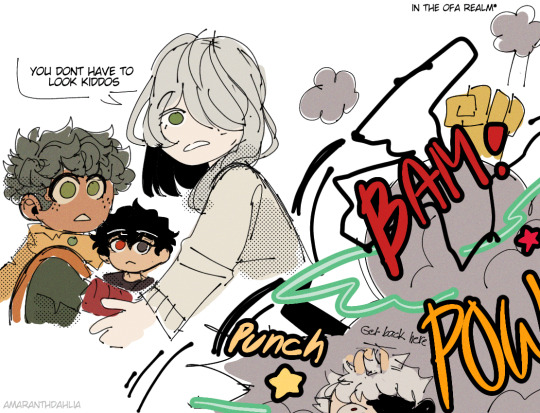
the ofa/afo plot ending 🥰 ( drew this around december )
oh hey i think this is the perfect post to dump all my ofa users doodles
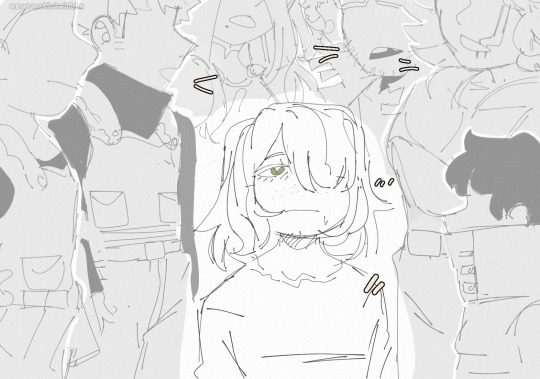
(caption: yoichi suddenly remembers why he made everyonr on the thrones in the first place)

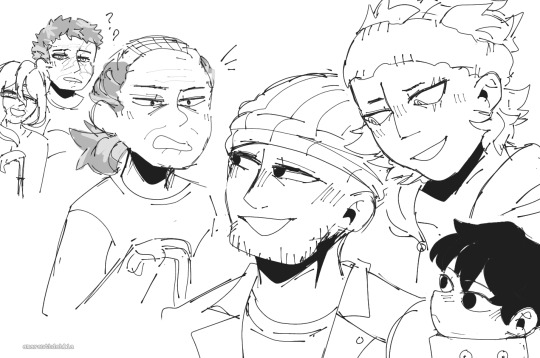
(caption: the holders get to grow old <3 also yes bruce is the only one balding, en is a kid here)

(caption: silly idea where the ofa users had to take care of baby afo together)
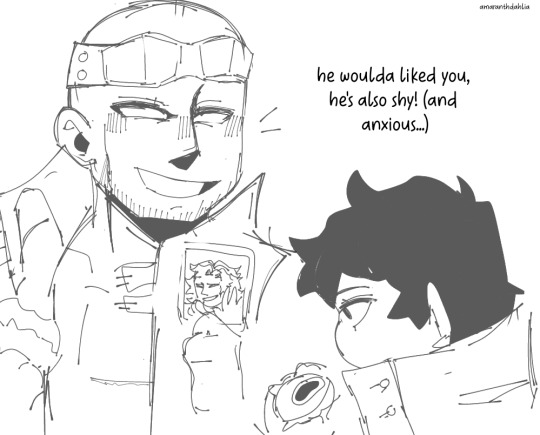

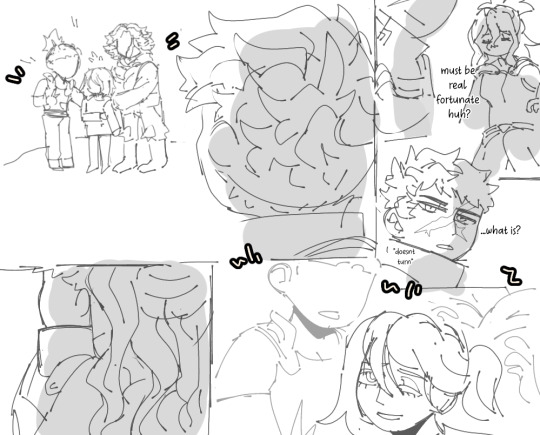
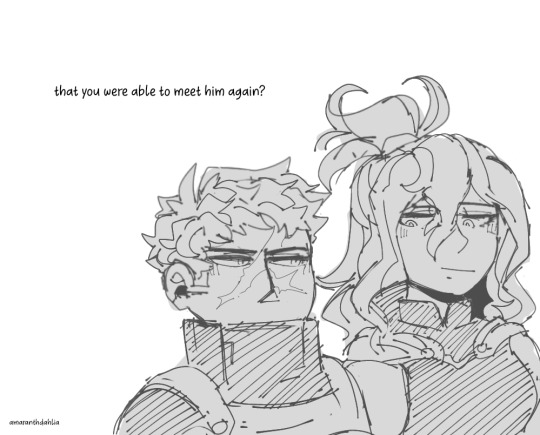
(caption: just the ofa users interacting, drew it on the same day)

(caption: yoichis way to thank his heroes lol)
#whew thats alot#initially i was planing to post the brothers first but i got lazy with fixing my art that i decided to go for#the holders first#anyways i love they#im gonna miss them fr#and uerg here comed the tagging#shigaraki yoichi#yoichi shigaraki#mha kudou#second one for all user#third one for all user#mha bruce#hikage shinomori#mha en#fifth one for all user#shimura nana#yagi toshinori#midoriya izuku#shimura tenko#yoichi is wearings kudoys shirt in the last one#also i was gonna include my ofa users sexuality/gender hcs but i hit the image limit#oh well ig thats staying on twitter unless#dahlia.art
283 notes
·
View notes
Text






🌻💛 P4 Pride Buttons 💛🌻
I'm so so excited for this set!! and I really hope you guys like it too! (I was going to wait until pride month to debut these, but I was just too excited lol plus it's great to be queer all year round!!🌈🌈🌈🌈)
> my shop <
#persona 4#p4#souyo#yukichie#adachi tohru#yosuke hanamura#souji seta#yu narukami#teddie hanamura#naoto shirogane#kanji tatsumi#chie satonaka#yukiko amagi#rise kujikawa#nanako dojima#ryotaro dojima#shrine fox#kou ichijo#daisuke nagase#whew//#this was so much work😱😱💦#but im just so excited#i just cant wait until june to post these#i really hope you love them all as much as i do🥰💘💞#i also have some more persona projects in the works rn👀#so keep an eye out for those!!#(also ya girl made it into persona con!!!!)#(hell yeaaasssss!!!)#edenfire shop#my merch
117 notes
·
View notes
Text
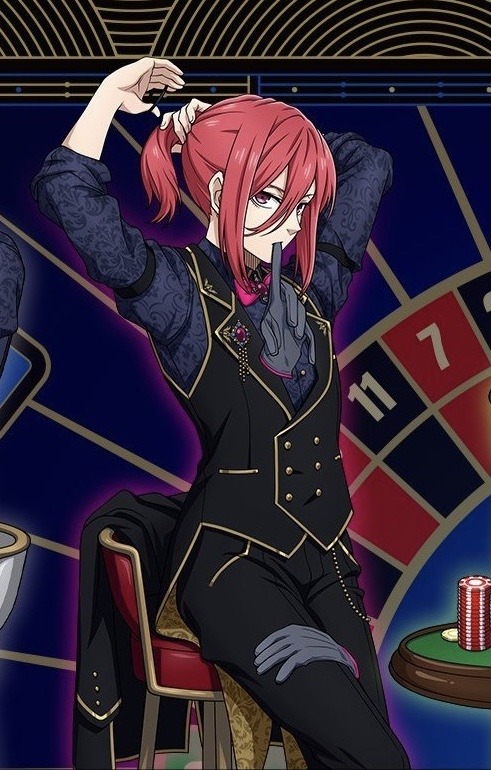
i don’t even have words anymore… like oh my god? oh. my god. hiiiiii. i’m on my hands and knees. please sir just one chance
#they knew what they were doing putting all of them in those tight pants too#fuck man.#whew#bllk#blue lock#chigiri hyoma#hyoma chigiri#me.txt
106 notes
·
View notes
Text
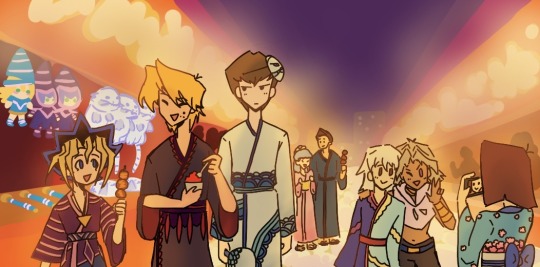
part two of this
#doodle#yugioh#ygo#yugioh season 0#ygo s0#jounouchi katsuya#joey wheeler#seto kaiba#hiroto honda#tristan taylor#miho nosaka#ryou bakura#marik ishtar#anzu mazaki#tea gardner#yugioh dm#WHEW ok i think thats all of them#yugi mutou
288 notes
·
View notes
Text
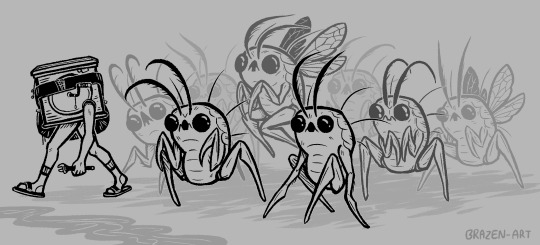
Gang's on the move
(a pipe burst in the hoard storage room)
#lineart my beloved#anyway here's the rest of Roscoe's bully squad#(minus one other oc)#(whom i am still developing)#but tagging the bugs here we go - Maude - Dorothy - Sybille - Ruth - Constance - Lottie - Irene and Winifred#whew#Roscoe named them#(Roscoe is. not very creative but insists on naming entities anyway. and she defaults to old lady names lol)#Roscoe's fearsome grandma gang#unfortunately the names aren't a marker for any real attachment#when one of the bugs.. disappears... the next one to show up just. inherits the unused name lmao#(did i mention that Roscoe's not that creative?)#poor bugs man#boss doesn't care about them#they should start a bug union#mind you. between all of them Roscoe is the only one with a thumb#and that's very handy (teehee) for things like surprise leaks#also shes scary.#like that's a wholeass jester whats a bug gonna do#there's at least a safety element i suppose#lethal company#lethal company oc#lethal company fanart#lethal company jester#lethal company hoarding bug#lethal company lootbug#Roscoe#oc#I'm not tagging the bugs a second time#they've had their time in the spotlight
60 notes
·
View notes
Text
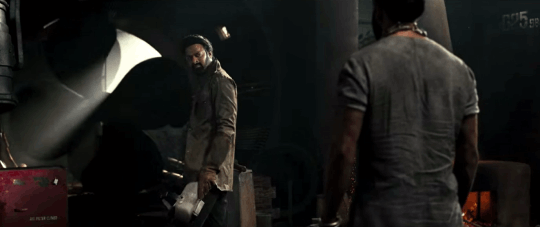
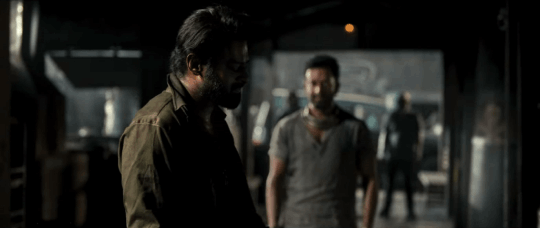
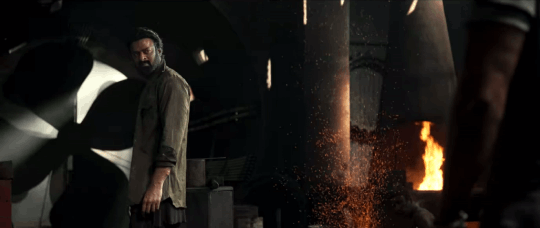

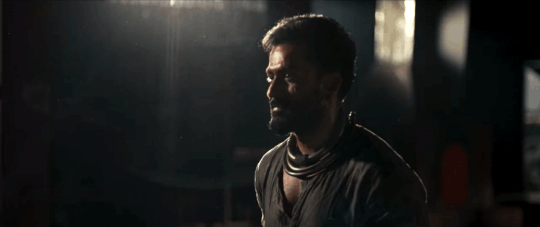
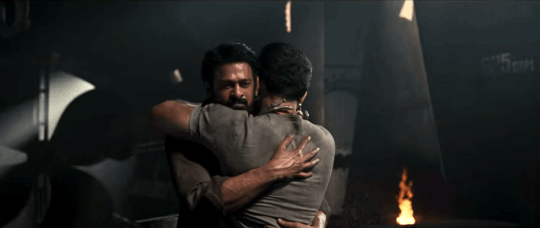

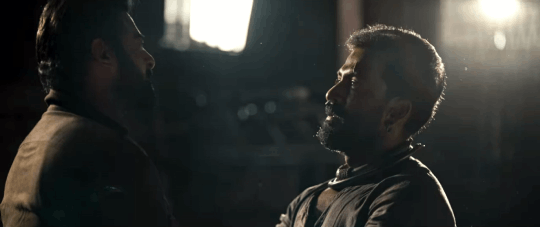
-Deva! Do you remember me?
-Your voice might have changed, but the way you call me hasn't. Other than my amma, there is only one other person in the entire world who calls me Deva...Varadharaja Mannaar!
SALAAR (2023)
#tollywood#salaar#varadeva#this hug is. so good. varadha hurrying toward deva. them clutching each other so tightly.#deva rocking them back and forth a little. varadha making the relieved/contented noise. whew. a good hug.#the reunion of all time.#adventures in gifmaking#my salaar gifs
89 notes
·
View notes
Text
Treatise on why No, the doctor just giving the narrator of Fight Club (full name) his requested sleep medication or sending him to therapy would not have Fixed Him
Firstly, saying giving him the insomnia meds would’ve fixed him ignores the reason he has insomnia in the first place. He is so deeply upset by his place in society that he literally cannot sleep. Drugging him to sleep would not change that. That, of course, is the easy, quick response.
But with regard to therapy? The biggest flaw is that it ignores a central tenet of the book. Part of what tortures the narrator and drives him to invent Tyler is that his feelings about this collective, systemic issue are constantly reduced to a Just Him thing. His seatmates ask what his company is. He’s the only one upset at the office. He gets weird looks if he says the truth of what he does. People will do anything in their power to pretend he is the issue, as an individual, because it is far scarier to consider the full implications of the systemic issues implied by what he is saying. Everyone treats it as if the issue is him, so he goes insane. He does anything to get someone to say, holy shit, that’s fucked up, what you’re a part of is wrong. In an attempt to feel any sort of vague sympathy and catharsis, he goes to support groups to pretend to be dying, because then at least people don’t habitually blame him for his anguish.
Saying therapy would fix him ignores that his problems are not individual. They are collective. It’s the reason the entire story resonates with people! Something deeply, unignorably wrong with society, where people would rather blame you for bringing it up than try and address it, because it feels impossible. I don’t blame people for this, really, because it IS scary. It’s terrifying to sit and feel like you’ve realized there’s something deeply, deeply wrong, but if you say something, people will get mad at you since it’s so baked into everything around you. Or, even if they agree, it’s easier to deal with the dissonance by pretending it’s individual.
And it’s not like that’s not the purpose therapy and medications largely serve, anyway. Getting into dangerous territory for this website, but ultimately, the reason the narrator was seeking medication was because it’s a bandaid. A very numbing bandaid. For these very large, dissonance causing problems, therapy does very little. Medications do what they always have, and distract you with numbness or side effects. It’s a false solution. He is seeking an individualized false solution because he has been browbeaten with the idea that this is an issue with him alone, when it's plainly clear it's not.
Don't get me wrong. Obviously he has something wrong with him. But it's a product of his situation. It is a fictional exaggeration of a very real occurrence of mental illness provoked by deep unconscionable dissonance and anguish. There is a clear correlation between what happens and his mental state and his job and how isolated he is.
The thing is, even if he were chemically numbed, I do think he would’ve lost it regardless. Many people on meds find they don’t fix things. For reasons I’ll get into, but in this case because even if numbed or distracted, once you’ve learned about deep, far reaching corruption in society, it’s very hard to forget. Especially if, in his case, you literally serve as the acting hand of this particular variety. He’s crawling up the walls.
So why do people say this? Well, it's funny I guess. Maybe the first time or whatever. But also, often, they believe it, to a degree. Maybe they've just been told how effective therapy and meds are for mental illness, they believe wholeheartedly in The Disease Model of Mental Illness, maybe they themselves have engaged with either and have considered it successful. Maybe they or someone they know has been 'saved' by such treatments.
But in all honesty.... What therapy can help with is mentality, it's how you approach problems. For issues on a smaller scale, not meaning they are easier to deal with my any degree, but ones that are not raw and direct from deep awareness of corruption; these are things that can be worked through if you get lucky and get an actually good therapist who helps build up your resiliency. But when your issue is concrete, something large and inescapable? It's useless. At best it can help you develop coping mechanisms, but there is a limit for that. There is a point where that fails. To develop the ability to handle something like this requires intense development of a comfort with ambiguity and dissonance and being isolated and a firm positioning of your purpose and values and and belief in wonder and all the other shit I ramble about. The things that the narrator lacks, which lead him to taking an ineffectual death knell anarchist self-destruction path. Therapy, where the narrator is, full of the knowledge of braces melted to seats and all the people that have to allow this to happen? It fails.
And meds — meds are a fucking scam. We know the working mechanism of basically none of them, the serotonin receptor model was made up and paid its way into prominence. We have very little evidence they're any better than placebo, and they come with genuinely horrific side effects. Maybe you got lucky. I did, on some meds. On others? I don't remember 2018. The pharmaceutical industry is also known for rampant medical ghostwriting, and for creating 'off-label' uses for drugs that have gained too many protests in their original use, then creating a cult of use to then have 'grassroots' campaigns for it to be made a label use (ie, legitimize their ghostwritten articles with guided anecdotes).
The DSM itself is basically a marketing segregation plot. It's an attempt to legitimize the disease model by isolating subgroups of symptoms to propose individualized treatments for subgroups that are not necessarily all that separate. But if the groups exist, you can prescribe more and different medications, no? Not to mention, if you use the disease model, you can propose that these diseases are permanent, or permanent until treated, considered more and more severe to offset and justify the horrific side effects of the medications. Do you know why male birth control doesn't really exist? Same reason. They can justify all the horrible side effects for women, because the other option is pregnancy. For men, it's nothing.
And they're not bothering to invent new drugs without side effects. When they invent new drugs it's just because the last one got too bad of a name, or they can enter a new market. Modern drugs don't work any better than gen1 drugs. They still have horrific side effects. At best, the industry will shit out studies saying the old one was flawed (truth) so they can say this new gen will be better (lie). They're doing it with ssris right now.
Fundamentally, the single proposed benefit of any of these drugs is that they numb you. To whatever is torturing you. It's harder to be depressed if you can't feel it, or if you just can't muster the same outrage. Of course, there is people who find that numbness to be helpful, or worth it. But often, it's stasis. For the people who have problems that can be worked on, it serves as a stopgap to not actually work on said problems. The natural outcome of the disease model is stagnation for those whose need is to develop skills and resiliency. It keeps them medicalized and dependent on the idea that they're diseased and incapable. Profitable. Stuck in the womb.
I’ve been there. It’s easier, to wallow, and resist growth because it’s difficult and painful and unfair and cruel and you can think of five billion reasons to justify your languishing. But don’t listen to anyone who tells you you’re just permanently damaged, no matter how nicely they word it, no identity or novel pathologization, no matter how many benefits they promise, especially if they swear up and down some lovely expensive medications with little solid backing and plentiful off-label usage and side effects that’ll kill you. Some days it feels like they want us all stuck in pods, agoraphobic and addicted to the ads they feed us to isolate the markets for the drugs they’ve trained us to beg them to pump us with. Polarization making it as easy as flashing blue light for go, red like for stop, or vice versa. I worry about the kids, for fucks sake. That’s a bit dark and intense, and I apologize. But I want you (generic) to understand, there is a profit motive. Behind everything. And they do not mean well. They do not care about your mental health or your rights or your personhood or your growth. They care about how they can profit off of you.
For those struggling with immovable, society problems, like the narrator grappling with how his job fits into and is accepted by society while his rejection and horror in the face of it does not, it can work about as well as any other drug addiction. Your mileage may vary. From what I've seen, recovering from being on prozac for a long time can be worse than alcohol. They put kids on this shit. They keep campaigning for more. Off label, again. A pharmaceutical company’s favorite thing to do has to be to spread rumors of someone who knows someone who said an off label use of this drug helps with this little understood condition. Or, in the case of mental illness, questionably defined condition. And like, damn, I know I'm posting on the 'medicalization is my identity' website so no one will like all this and has probably stopped reading by now, but yall should be exposed to at least one person who doubts this stuff. Doesn't just trust it. Because I mean, that's the thing right?
It's so big. What would it mean, for this all to be true? Yeah, everyone says pharmaceutical companies are evil and predatory and ghostwriting, but to think about what that really entails. Coming back to the book, everyone knows the car lobby is huge and puts dangerous vehicles through that kill people. What does it mean if the car companies all hire people to calculate the cost of a recall and the cost of lawsuits? No one wants to think about the scale that means for people allowing it or the systems that have to be geared towards money, not safety like they say. Hell, even Chuck misses the beat and has the narrator threaten his boss with the Department of Transportation. And shit, man, if every company is doing this, you think Transportation doesn't know? That they give a fuck? You're better off mailing all the evidence to the news outlets and hoping they only character assassinate you a little bit as they release the news in a way that says it's all the fault of little workers like you, not the whole system. Something something, David McBride, any whistleblower you feel like, etc.
So I don't blame you, if your reaction is "but but but, that can't be right, people wouldn't do it, they wouldn't allow it" or just an overwhelming feeling of dread that pushes you to deny all of this and avoid thinking about it. Just know, that's in the book. That's all the seatmates on the flights. That's all his fellow officemates. It's easier to pretend, I know.
But think about, how the response fits in with the themes of the book. The story, as a movie too. What drives the narrator’s mental breakdown? How would you handle being in his position? How would you handle being his seatmate? It’s easy to say you’d listen. But have you? Have you had any soul wrenching betrayals of how you thought society worked? How about a betrayal by the thing that promised to be the fix of the first? Can you honestly say you wouldn’t follow that gut instinct, saying follow what everyone says, that person must just be crazy, evil, rude, cruel, whatever it is that means you can set what they said aside?
For a lot of people, they can do that, I guess. Set it aside. Reaching that aforementioned state of managing to cope with the dissonance and ambiguity and despair is very hard. The narrator made the Big Realization, but he couldn’t cope. He self-destructed. Even when people don’t make the big realization consciously, they’re already self-destructing. It’s hard to escape it when it feels easier than continuing anyway. When it feels like the only option,
Would therapy fix the narrator of Fight Club? Would meds fix the narrator of Fight Club? No. He knows too much. All meds will do, by the time he’s in the psych ward, is spiritually neuter him. A silly phrase, but really. Take the wind out of his sails.
Is he fixed if he doesn’t try to blow up town? If he just shuts up and settles in and stops costing money? If he still can’t cope with the things he’s unearthed? Do you see how this is a commentary in a commentary in a commentary?
Fight Club is an absolutely fascinating story because of this. The fact that it addresses the fallout of knowing. The isolation. The hopelessness. The spiral that results from a lack of hope. This is, I think, what resonates most with people, even if not consciously. Going insane because you’ve discovered something you wish you could unknow. It’s a classic horror story. Should our society be lovecraftian evil? I don’t think so.
Do I think changing it will be easy? No. Lord knows a lot exists to push people who make these sorts of Realizations towards feelings of individuality and individualized solutions and denial and other distractions and coping methods. And to prevent people who make One realization from expanding on it and considering further ramifications. Fight Club itself gets into this; the isolation of men being a strict part of the role society shapes for their sex leaves them very vulnerable to death fetishes, in a sense, and generally towards self destructive violence. It helps funnel them away from substantial change and towards ineffectual change. Many things, misogyny, racism, serve to keep people isolated from one another, individualized, angry, and impossible to work with. Market segregation; god knows even appealing on those fronts has become such a classic ploy that companies do it now, the US military frames its plundering that way, etc.
I’ve wandered a bit but ultimately, my point is this: Fight Club is a love letter to the horrors of critical thinking, and the importance of not falling into the trap of self destruction and hopelessness in the face of it. The latter is why Tyler was an anarchoterrorist instead of anything useful. The latter is why it was a death cult. It’s important to work through the horrors of critical thinking so you can do it, and stand on the other side ready to believe in each other. It’s worth it.
#fight club#my writing#uh. sorta#If you disagree with me it's fine btw. That's a given for me but I realize that's not usual for this website#my big desire is always to provoke thought and get people to think about why they think things#not necessarily to get them to agree with me. though obviously like any person i enjoy that#it was nice to type this out#also#aside from the prozac withdrawals mention and my own experience w memory loss (hilariously not even the most major of my beefs with the#medical industry! or even just the mental health industry! but its an easy nonoffensive one so#anyway i kept it nonspecific because if you go specific it becomes easier for people to just go 'oh well its That that's the problem and i#dont need to reflect at all on my drug/condition/issue/etc'#which ppl will anyway ofc. but yk#maybe theyll find it easier to ignore without the horrific specific examples but i want to leave it broad because 1. doing research and#going past the first thing you find and confirmation bias stuff is good 4 u#second. it's better imo to leave it more open for people to try and apply it broadly#whew ANYWAY#a bonafide Rant#i shouldve put#anti psychiatry#in the first few tags. i havent really looked on tumblr to see what the community 4 that is like on here because it feels like an oxymoron#on this website#but im sure it probably exists even if its used for smth else#(please change)
40 notes
·
View notes
Text
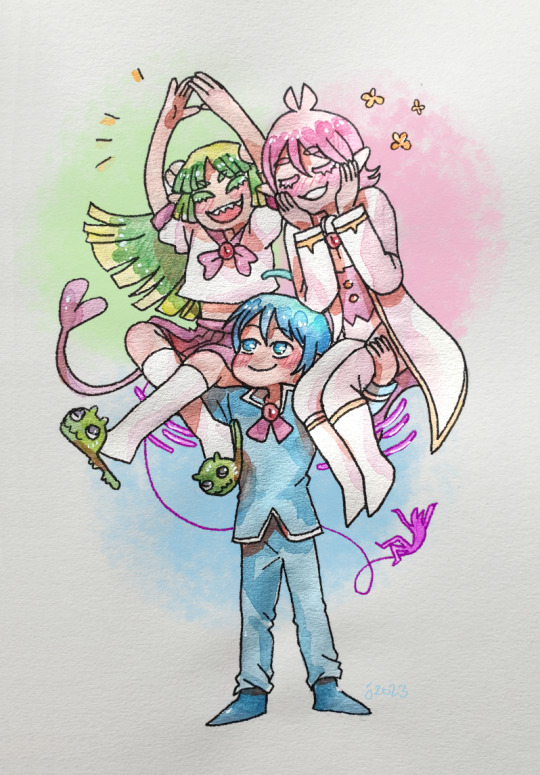
finally iruma gets to show off! with a little help...
(azz ver / clara ver)
an alternative ending:
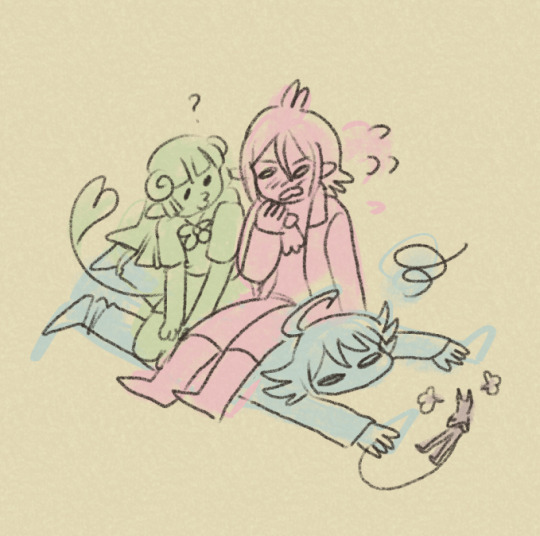
#mairimashita! iruma-kun#whew got them all done!!#also caught up with anime and continued reading manga from there and it's been such a blast!!!#own art
181 notes
·
View notes
Text
taking my mom to the doctor again tomorrow~ please send any good vibes/prayers/thoughts her way that all goes smoothly! 🙏🙏

#always sorry to be asking this of you guys ;-;#but always so grateful for your kindness!!#whew it's been quite a spring#long story short my mom will also be facing oral surgery soon#and as for me ah haaaa i dislocated a rib (eventually two) and can't seem to get them to stay put despite treatment ;-;#anyway! good news...a dream literary agent requested the full manuscript of my thriller novel AHH#another dream agent offered me an R&R which basically means she wants me to make certain revisions and resubmit#if i can do the revisions well enough she MIGHT offer askfjaf...she said she absolutely loved my book!!#but it's been challenging to work on everything during this spring of health issues gahh#trying my best though and fingers crossed one of these agents will be the one!!! 🙏🙏#how are you all doing?? feel free to send an ask or reply here! i love to hear about what's happening in your lives!!#personal
40 notes
·
View notes
Text
More beautiful boys via Aidan Monaghan

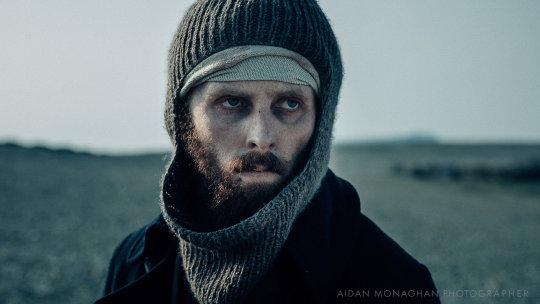
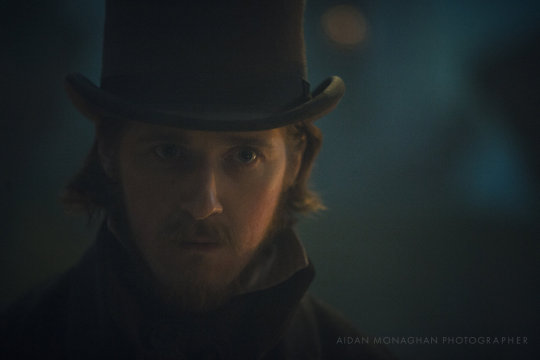
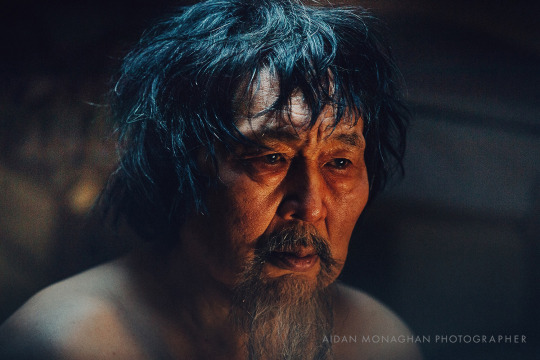
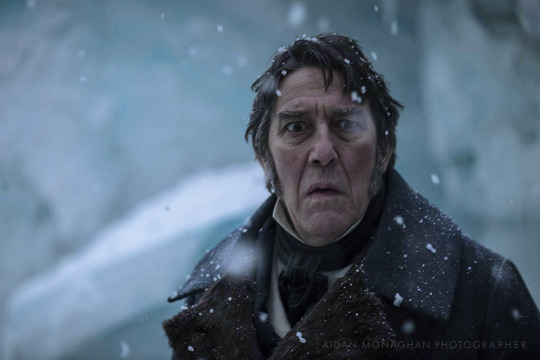
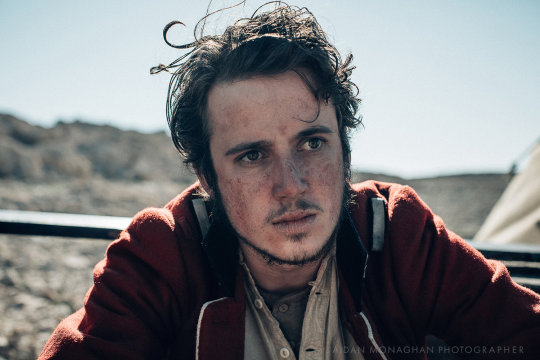
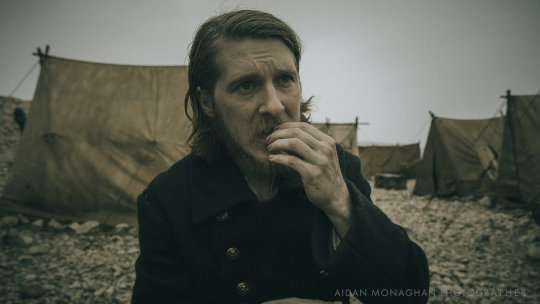

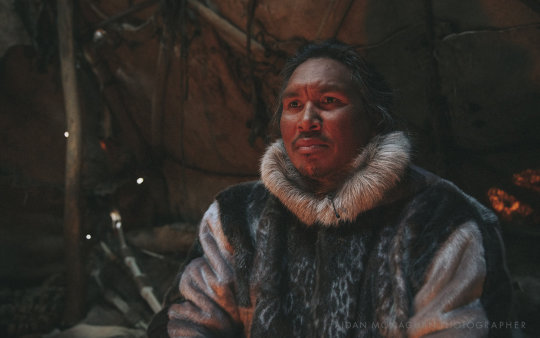
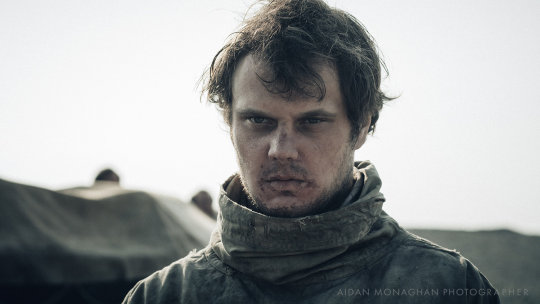
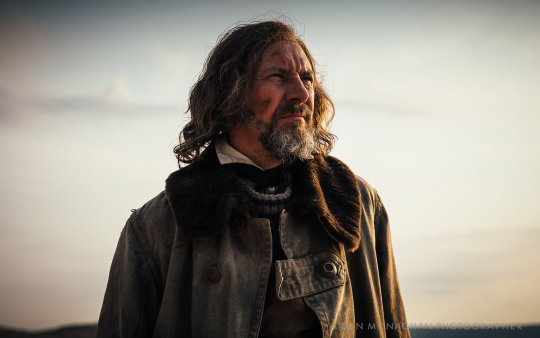
#the terror amc#the terror#tom's terror compilation#i don't want to tag all of them... i do not want to#billy gibson#cornelius hickey#netsilik shaman#sir john franklin#william pilkington#john bridgens#netsilik hunter#magnus manson#thomas blanky#whew#aidan monaghan
31 notes
·
View notes